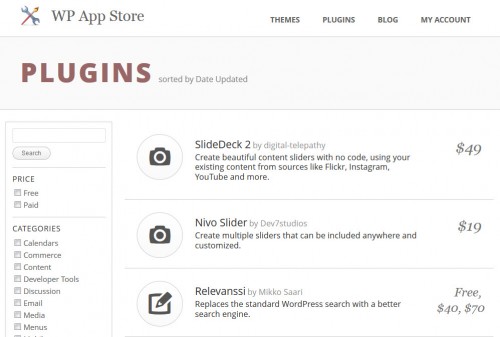 It was just a few years ago when the idea of creating an Apple like app store for plugins and themes was discussed throughout the community. This app store would not have to operate under the same guidelines as the official WordPress repositories and would feature the vast assortment of commercial options available. WP App Store is one such site. The site is just over one year old so I thought I’d get in touch with Brad Touesnard to see how the past year has been and what their plans are for 2013.
It was just a few years ago when the idea of creating an Apple like app store for plugins and themes was discussed throughout the community. This app store would not have to operate under the same guidelines as the official WordPress repositories and would feature the vast assortment of commercial options available. WP App Store is one such site. The site is just over one year old so I thought I’d get in touch with Brad Touesnard to see how the past year has been and what their plans are for 2013.
What was the motivation behind launching the WordPress App Store considering WPPlugins was the first of its kind?
I thought it would be really awesome to have all the best themes and plugins in one place and be able to click once to buy and install. No downloading and uploading zips. I mean, everyone uses the WordPress.org repo and everyone loves how easy it is to install a theme or plugin. I wanted to offer the same simplicity for commercial themes and plugins, but only the best.
wpplugins.com doesn’t have the best themes and plugins. All of the big brands are missing. When I started this project, the first thing I did was get the big guys on-board. If I hadn’t been able to do that, it would have been a non-starter.
How many people are involved with this project?
There are four people involved with this project: http://wpappstore.com/about/
Was the decision to support only GPL licensed products made before the launch or was there any discussion of listing everything?
We’ve been 100% GPL since day one. I don’t see why you would go any other route.
Can you describe how the App Store works?
WP App Store is a WordPress plugin that you install into your WordPress dashboard. Then you can browse themes and plugins that we have in our marketplace from your WordPress dashboard. When you find something you like, you click Buy & Install and once you enter your payment details, your theme or plugin is installed automatically.
The site is only a year old. What types of numbers are you seeing stat wise and financially? Secondly, what’s the adoption rate been like? Are you noticing a continued interest or influx of new users?
I prefer not to share sales or traffic figures, but just to say that currently monthly revenue not sustainable and that few people have installed the plugin. The fact that they have to download it from our website (the plugin is not allowed in the WordPress.org repo) and upload it to your WordPress install is a huge barrier for our customers. We had a few strategies to make it much easier for people to install the plugin, but unfortunately none of them panned out. After talking to customers, I also found out that most of them are happier purchasing directly from vendors and only come to WP App Store to discover new themes or plugins.
What lessons have you learned from this experience?
I’ve learned that even though a business idea seems like a sure thing and everyone is telling you it’s a great idea you should still talk to customers first. Always make sure that you’re solving a problem that people need solved badly enough that they’re willing to open their wallet for you.
Other WordPress based app stores have come and gone. How can the WordPress App Store stay in business for the long haul?
We need to switch to a more traditional marketplace and start driving sales. We need to continue curating our product listing and add new products every month to keep customers coming back.
If the store were to shut down, would users be able to download their purchases and take those with them?
Yes, in fact almost all of our vendors have integrated our postback API into their system and when a sale occurs, they create a user account and register the purchase in their own system as well. So almost all of our customers should actually have an account at each vendor.
What excites you about this project?
I think a marketplace where you can find all the best themes and plugins for WordPress is exciting. It’s audacious to say “the best themes and plugins”, but I like that it’s a clear mission statement.
What can we look forward to in year number two?
As of (July 6), you can now purchase products from the website. We will be working on a major overhaul of the website this summer and hope to drastically improve the shopping experience.



Hi,
I think people prefer to go buy directly from the vendor because of the promised support. How do you handle support for users who buy products through the app?